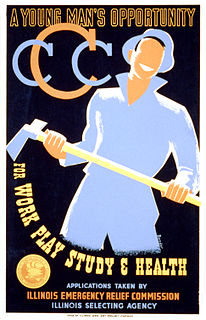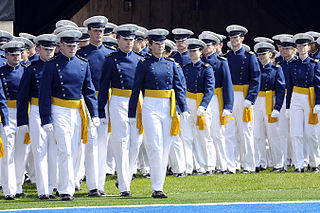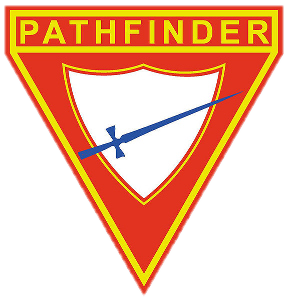Related Research Articles
CCC may refer to:

The Civilian Conservation Corps (CCC) was a voluntary government work relief program that ran from 1933 to 1942 in the United States for unemployed, unmarried men ages 18–25 and eventually expanded to ages 17–28. Robert Fechner was the first director of this agency, succeeded by James McEntee following Fechner's death. The CCC was a major part of President Franklin D. Roosevelt's New Deal that supplied manual labor jobs related to the conservation and development of natural resources in rural lands owned by federal, state, and local governments. The CCC was designed to supply jobs for young men and to relieve families who had difficulty finding jobs during the Great Depression in the United States. The largest enrollment at any one time was 300,000. Through the course of its nine years in operation, three million young men took part in the CCC, which provided them with shelter, clothing, and food, together with a wage of $30 per month.

A Scout is a child, usually 10–18 years of age, participating in the worldwide Scouting movement. Because of the large age and development span, many Scouting associations have split this age group into a junior and a senior section. Scouts are organized into troops averaging 20–30 Scouts under the guidance of one or more Scout Leaders or Scoutmasters. Troops subdivide into patrols of about 6–8 Scouts and engage in outdoor and special interest activities. Troops may affiliate with local, national, and international organizations. Some national Scouting associations have special interest programs such as Air Scouts, Sea Scouts, outdoor high adventure, Scouting bands, and rider Scouts.

A cadet is an officer trainee or candidate. The term is frequently used to refer to those training to become an officer in the military, often a person who is a junior trainee. Its meaning may vary between countries which can include youths in voluntary youth organisations.

The Royal Canadian Sea Cadets is a Canadian national youth program sponsored by the Canadian Armed Forces and the civilian Navy League of Canada. Administered by the Canadian Forces, the program is funded through the Department of National Defence, with the civilian partner providing support in the local community. Cadets are not members of the Canadian Armed Forces.

The Pathfinder Club, or simply Pathfinders, is a department of the Seventh-day Adventist Church (SDA), which works specifically with the cultural, social and religious education of children and teens. Boys and Girls 10 years and up are members of the club all over the world.

Assemblies of God youth organizations include two youth organizations operating under the auspices of the Assemblies of God, the Royal Rangers and the Mpact Girls Clubs.

The National Cadet Corps (NCC) is the youth wing of the Indian Armed Forces with its headquarters in New Delhi, India. It is open to school and college students on voluntary basis as a Tri-Services Organisation, comprising the Army, the Navy and the Air Force, engaged in developing the youth of the country into disciplined and patriotic citizens. The soldier youth foundation in India is a voluntary organization which recruits cadets from high schools, higher secondary, colleges and universities all over India. The Cadets are given basic military training in small arms and drill. The officers and cadets have no liability for active military service once they complete their course. The emblem of the NCC consists of 3 colours; red, dark blue and light blue. These colours represent the Indian Army, Indian Navy and Indian Air Force respectively. The 17 lotuses indicate the 17 directories of India.

The Medical Cadet Corp (MCC) is a program of the Seventh-day Adventist Church started in the 1930s in the United States with the intention of preparing young men of draft age for military service in noncombatant roles. The training included drill, first aid, military courtesies, organization of medical corps, defense against chemical warfare, principles of anatomy and physiology, physical exercises and character development. The program was temporarily suspended at the end of World War II. It was reactivated in 1950 and in the next few years was adapted internationally. The program was deactivated by the General Conference of Seventh-day Adventists in the early 1972 but continued independently in a few locations with an emphasis on rescue and disaster response.

The Pushmataha Area Council is part of the Boy Scouts of America. It renders service to Scout units in ten counties of North Mississippi, providing skills training and character development to boys and girls between the ages of 5 and 18. The council also serves boys and girls between the ages of 14 and 21 through Venturing Crews and Explorer posts.
The Canadian Cadet Organizations, marketed under the name of Cadets Canada, are a youth program known as the Royal Canadian Sea Cadets, Royal Canadian Army Cadets, and Royal Canadian Air Cadets. The program is sponsored by the Canadian Armed Forces and funded through the Department of National Defence (DND), with additional support from the civilian Navy League, the Army Cadet League and the Air Cadet League, as well as local community sponsors that include service organizations and parent sponsoring groups supervised by the Leagues.
GEMS Girls' Clubs is a non-denominational, non-profit, Christian organization that seeks to equip women and girls to live radically faithful lives for Christ. Clubs are established in churches and other Christian organizations and allow women to mentor girls as they develop a living, dynamic relationship with Jesus. GEMS, which stands for "Girls Everywhere Meeting the Savior", was founded in 1958 in Grand Rapids, Michigan, by Barbara Vredevoogd and has since grown to become an international ministry with 5,200 women serving over 23,000 girls in more than 800 clubs in the United States, Canada, Zambia, Kenya, Spain, Australia, New Zealand, Uganda, China, South Africa, Zimbabwe, and The Bahamas.

The West Point Camporee is an annual invitational camping event sponsored by the United States Military Academy at West Point, New York. It attracts Scout units, from over a dozen states, along the east coast of the United States; from over 75 different Scout councils. It's one of the largest annual Scouting events held in the country. The event consists of a weekend campout on the Academy property with static and active displays, competitions, demonstrations, and a trading post. Attendees report that it's exclusively run by the Cadets.

ThereforeGo Ministries is a Christian youth ministry for short-term mission trips in the United States and Canada that was formed in September 1919. The organization is a non-denominational ministry that has its roots in the Christian Reformed Church in North America, but partners with other Christian denominations. ThereforeGo is a member of the Evangelical Council for Financial Accountability (ECFA) and Standards of Excellence in Short-Term Mission (SOE). It is one of three youth ministries under the Dynamic Youth Ministries umbrella organization, with the other two being GEMS Girls' Clubs and the Calvinist Cadet Corps.

The Army Reserve Officers' Training Corps (AROTC) is the United States Army component of the Reserve Officers' Training Corps. It is the largest Reserve Officers' Training Corps (ROTC) program which is a group of college and university-based officer training programs for training commissioned officers for the United States Army and its reserves components: the Army Reserves and the Army National Guard. There are 30,000+ Army ROTC cadets enrolled in 274 ROTC programs at major universities throughout the United States.
Youth organizations in the United States are of many different types. The largest is the government run 4-H program, followed by the federally chartered but private Scouting movement groups: the Boy Scouts of America (BSA) and the Girl Scouts of the USA (GSUSA). Another somewhat smaller but co-ed Scouting derived group is Camp Fire. Other youth groups are religious youth ministries such as the evangelical Christian Awana, Seventh-day Adventist Pathfinders, and Assemblies of God Royal Rangers.

Wood car racing is a racing event for youth who build small cars from wood, usually from kits containing a block of pine, plastic wheels and metal axles. Kids from all over the world participate in events related to wood car racing.
There are many national organisations in the United Kingdom that have been established to provide services to people under the age of 18.

The Junior Reserve Officers' Training Corps is a federal program sponsored by the United States Armed Forces in high schools and also in some middle schools across the United States and at US military bases across the world. The program was originally created as part of the National Defense Act of 1916 and later expanded under the 1964 ROTC Vitalization Act.
References
- ↑ De Moor, Bob (October 2009). "Thanks Guys". The Banner. p. 3. Archived from the original on October 19, 2009. Retrieved January 22, 2010.
- ↑ Vandenberg, Sophie (October 2008). "Record Rainfall Forces Camporee Evacuation". The Banner. p. 10,11. Archived from the original on July 20, 2011. Retrieved January 22, 2010.
- ↑ Webley, Noel (August 12, 2008). "Boys evacuated from Canadian camping trip". The Grand Rapids Press. Retrieved January 22, 2010.
- ↑ Williams, Walt (August 6, 1993). "Campers Practice their Survival Skills". The Modesto Bee. p. I2. Retrieved February 20, 2010.[ dead link ]
- ↑ "Dynamic Youth Ministries". The Barnabas Foundation web site. The Barnabas Foundation. Archived from the original on July 7, 2011. Retrieved January 22, 2010.
- ↑ see external links for GEMS site
- ↑ see external links for YU site
- ↑ Russell, Matthew S (May 19, 2009). "Three Cadets receive group's highest honor". The Grand Valley Advance. Retrieved January 22, 2010.
- ↑ "History of the Pinewood Derby". Derby Dust. January 22, 2019. Retrieved April 23, 2019.
- ↑ "Calvinist Cadet Corps". ECFA web site. Evangelical Council for Financial Accountability. Retrieved January 22, 2010.